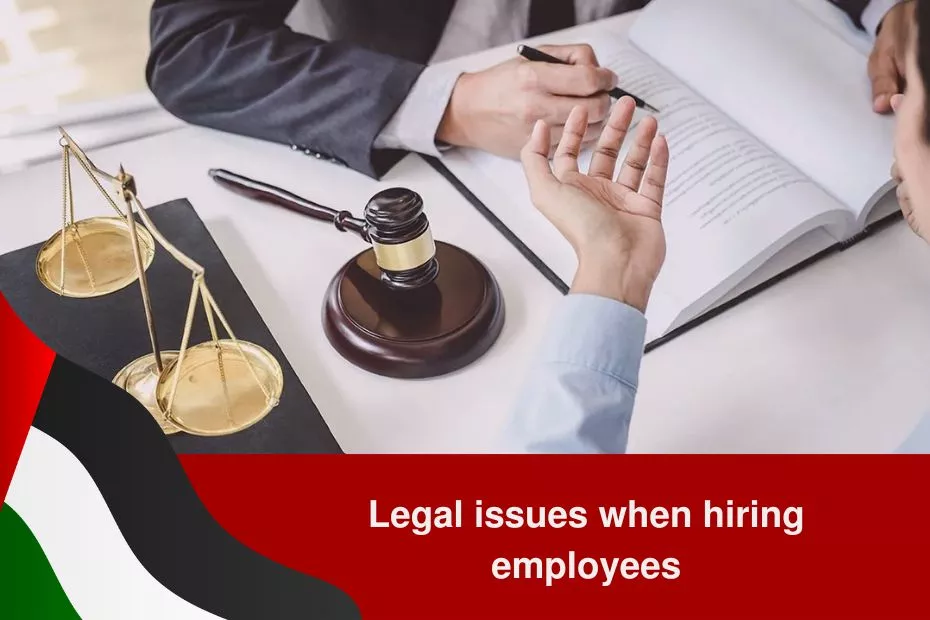The process of hiring employees in the UAE can be challenging due to the complex legal framework. Understanding the legal requirements and regulations is crucial to ensure compliance and avoid potential legal issues.
This article will cover various legal issues when hiring employees in the UAE 2024, including work visas, employment contracts, working hours, and more.
Contact Al Mulla Labor Lawyer in Dubai. Click the WhatsApp icon below or go to the Contact Us page. Locations: Dubai, Abu Dhabi and Ras Al Khaimah.
Table of Contents
Common Legal Issues When Hiring Employees in UAE
When hiring employees in the UAE, businesses must be aware of several common legal issues to ensure compliance and avoid disputes. These issues encompass various aspects of employment, from visa requirements to contract terms and employee benefits.
- Work Visas: Employers must ensure all foreign employees have valid work visas. This includes obtaining the necessary permits and adhering to sponsorship regulations.
- Employment Contracts: All employment relationships must be documented with a written contract that specifies job details, salary, and contract duration. As of 2024, only fixed-term contracts are allowed. Find expert employment contract review service in UAE.
- Minimum Wage: While no national minimum wage exists, salaries must cover employees’ basic needs and comply with industry standards. Read about Basic Salary in UAE Labour Law.
- Probation Period: Employees can be on probation for up to six months, during which they can be terminated with 14 days’ notice.
- Working Hours and Overtime Pay: The standard working hours are 8 hours per day or 48 hours per week. Overtime pay must be provided for hours worked beyond this limit.
- Timely Salary Payments and WPS: Salaries must be paid through the Wage Protection System (WPS) to ensure timely and accurate payments.
- Pension Scheme and End-of-Service Benefits: Employers must contribute to the pension scheme for UAE nationals and provide end-of-service benefits for all employees.
- Public Holidays and Leave Entitlements: Employees are entitled to paid leave for UAE labour law public holidays and various types of leave, including annual, maternity, parental, sick, and compassionate.
- Termination and Notice Periods: Termination must comply with the employment contract notice period UAE, which varies from 30 to 90 days, depending on the circumstances.
Legal Services for Hiring Employees in the UAE
Al Mulla Lawyers provides specialized legal services to help businesses navigate the complexities of legal issues when hiring employees in the UAE. Their services include:
- Company Registration: Assistance with mainland and free zone company registration, ensuring compliance with local laws and regulations.
- Work Permit and Visa Sponsorship: Expert guidance on obtaining work permits and sponsoring employee visas, including cost management and compliance with MoHRE regulations.
- Employment Contracts and Policies: Drafting and reviewing employment contracts to ensure they meet legal requirements and protect the interests of both employer and employee.
- Compliance and Advisory Services: Ongoing support to ensure that businesses remain compliant with the ever-evolving UAE labor laws, including updates on new regulations and best practices.
- Dispute Resolution and Litigation: Representation in labor disputes and legal proceedings, ensuring that employers’ rights are protected and that issues are resolved efficiently.
By partnering with Al Mulla Lawyers, businesses can mitigate legal risks and focus on growth and development in the UAE market.
Learn about the best Labor Lawyers Near You in Dubai for expert legal consultation, and read about Dubai’s top Employment Litigation attorney.
FAQs about Considerations when Hiring Employees UAE
Conclusion about the legal issues when hiring employees in UAE.
Navigating the legal landscape when hiring employees in the UAE requires a thorough understanding of local labor laws and regulations.
Employers must be diligent in their practices, from obtaining work visas and drafting employment contracts to ensuring compliance with working hours and leave entitlements.
Legal experts like Al Mulla Lawyers can provide the necessary support to ensure compliance and protect the interests of both employers and employees.
By staying informed and seeking professional legal assistance, businesses can successfully manage their workforce in the UAE and avoid common legal pitfalls.
Contact Al Mulla Lawyers today! Click the Whatsapp icon below or visit our Contact Us page.
Find us at these locations:
– Dubai: Deira, Port Saeed, Street 8, City Avenue Building, Office 705-708.
– Abu Dhabi: Corniche Street, Golden Tower, Office 22.
– Ras Al Khaimah: Al Nakheel, Al Maamoura Building (Emirates NBD Bank Building), Fourth Floor.
A legal consultant specializing in UAE labor law. He regularly publishes articles on the website and writes on various areas of UAE law, with a specific focus on labor law.
